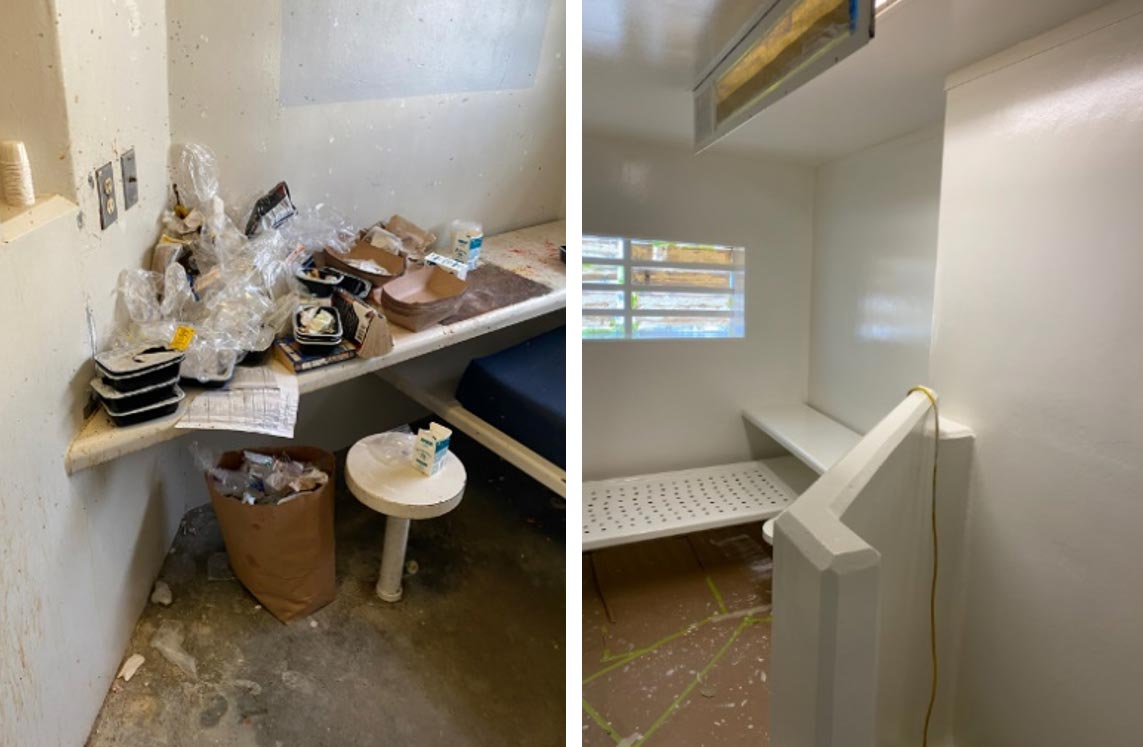News Spotlight: Humanity in Corrections - Treating Complex Mental Health Disorders in Prisons
June 30, 2023
About
Footsteps echo loudly off concrete walls. A loud, angry voice can be heard one moment, soft whispers the next. A corrections officer checks in through the scratched glass of a narrow cell window, to ask how an individual is doing today. He may respond in an angry outburst, with silence, or he may break out into song. It all depends on the individual and what they are experiencing or feeling in that moment. This is a regular occurrence at the Sky River Treatment Center (SRTC) at Washington State Department Corrections’ Monroe Correctional Complex (MCC) where individuals with serious mental health illness and substance use disorders are housed as sentenced by the court.
Most incarcerated individuals in the SRTC are battling complex psychotic and personality disorders that can, in some cases, lead them to neglect their personal hygiene and have a hard time managing daily living activities, including keeping their cell clean. This is often associated with significant disorganization due to their mental illness. For some people with a serious mental illness, self-care can be impaired because of their symptoms.
“Some incarcerated individuals neglect themselves as a way of expressing their frustration, their anger, their helplessness,” said DOC Chief of Psychology Bart Abplanalp. “As much as we try to help, some individuals can be extremely challenging and sometimes dangerous to engage with.”
Sometimes those with mental health diagnoses struggle with change. Routine is very important and the idea of getting outside of that routine can be very overwhelming. Often, people don’t receive treatment until they become incarcerated, and medications and therapy are new concepts they must adjust to. While they are at SRTC, they receive the proper medications and treatment, and before they leave, their psychiatric social worker establishes services in the community.
Recently, an issue at SRTC regarding cell conditions arose with two individuals with serious mental health concerns and antisocial personality disorder. The individuals had collected discarded meal trays, litter was piled and unsanitary bedding was on the floor.

Cell before and after clean up. (Photos courtesy of DOC staff.)
While this type of behavior is not typical of all incarcerated individuals with mental illness, “some individuals struggle in a highly controlled environment. The reasons for this behavior can be as complex as their mental health needs. Some individuals struggle with following instructions. Making decisions about entering a cell without an incarcerated individual’s cooperation, can bring risk to staff and these decisions have to be considered very carefully,” said DOC Director of Behavioral Health, Dr. Karie Rainer. “As a result, their only means of control of their environment, such as severely degrading their cells like this is a way for them to express themselves.”
The individuals were instructed to clean their cells on multiple occasions, but when they did not they were moved to clean cell. DOC’s Secretary Cheryl Strange launched a Secretary Special Inquiry Review (pdf) to determine how improvements can be made supporting these individuals.
A multi-disciplinary team comprised of mental health professionals, medical staff, maintenance employees, correctional staff and agency leadership participated in the inquiry. Throughout the inquiry there were areas for improvement identified including opportunities for improved conditions and communication. The special inquiry determined that despite the challenging behavior contributing to the cell conditions, the cells should be cleaned up immediately after finding them in a degraded position.
When managing complex situations, it is critical that staff communicate frequently and often to ensure that incarcerated individuals are given optimum care. Staff had been confused about who was responsible for addressing the cell conditions and there were differences of opinion as to whether hygiene protocols outweighed the behavioral treatment plan developed by mental health professionals. Sometimes in instances like this, drastically changing the environment of someone with a serious mental health diagnosis is in, can lead to more challenges like outbursts of anger potentially leading to safety risks.
In this case, the inquiry was helpful for examining a rare occurrence with staff to help ensure that individuals in the department’s care and custody are receiving the care they need while still taking into consideration the complex factors that may contribute to an individual’s behavior.
While the agency continues to make strides to improve conditions of confinement, treating incarcerated individuals with severe mental illness will always provide unique challenges. The dedicated staff at SRTC focus on treating the mental illness, providing social skills and coping mechanisms and preparing individuals for their eventual release.
There are times where there is room for improvement, however, at all times, the staff at SRTC take their job very seriously. If you are interested in learning more about the work they do every day, you can read more in A Day in the Life – Sky River Treatment Center.
